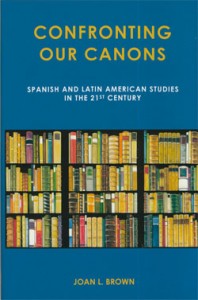 What is a canon and why does it matter? Author Joan L. Brown, Elias Ahuja Professor of Spanish at the University of Delaware, attempts to answer these complex and loaded questions in her recent book Confronting Our Canons: Spanish and Latin American Studies in the 21st Century, published in 2010 by Bucknell University Press. Brown’s lucid and gripping account of the myth of “the canon” in the contemporary University—including its very real consequences—has earned the highest recommendation from CHOICE as a four-star “fundamental book.” According to David T. Gies, Commonwealth Professor of Spanish at the University of Virginia, the book is a “call to arms and action that all shapers and readers of literary canons should study with care.” We asked Joan to talk with us more informally about this important book and its roots in her work as a professor of foreign languages.
What is a canon and why does it matter? Author Joan L. Brown, Elias Ahuja Professor of Spanish at the University of Delaware, attempts to answer these complex and loaded questions in her recent book Confronting Our Canons: Spanish and Latin American Studies in the 21st Century, published in 2010 by Bucknell University Press. Brown’s lucid and gripping account of the myth of “the canon” in the contemporary University—including its very real consequences—has earned the highest recommendation from CHOICE as a four-star “fundamental book.” According to David T. Gies, Commonwealth Professor of Spanish at the University of Virginia, the book is a “call to arms and action that all shapers and readers of literary canons should study with care.” We asked Joan to talk with us more informally about this important book and its roots in her work as a professor of foreign languages.
——————————————-
1. Please tell us about yourself: your professional background and what you do now.
I’m a Spanish professor at the University of Delaware. I teach everything from Spanish conversation to literature by women in translation to graduate seminars on the contemporary Spanish novel.
2. How did you become interested in the subject of canons?
I began my career by studying something outside the accepted literary canon: contemporary Spanish fiction by women. So naturally I wondered about the question of inclusion and exclusion. Specifically: Why were these superb, prizewinning authors not in the canon? Who decided canon contents and what were the rules? My first motivation for wanting to learn about canon formation was the hope that if I could figure out the mechanism, I could open the gates for deserving women writers.
3. Can you give us the short answer to the question you ask in your book: “What is a canon and why does it matter?”
For literature and every other art, a canon is a selection of items that are considered most valuable, chosen from an unmanageable number of possibilities. At the most basic level, canons stave off chaos by sorting “the best” from the rest. In addition to this evaluative function, canons have sociocultural functions: they define the boundaries of a field and the precepts of a community. Canons have great power due to their control over pedagogy. Whatever is considered most valuable by experts will be taught and thereby preserved in the culture. If something does not make it into the canon, it does not survive from one generation to the next. Along with their authority, canons also have great mystery, since admission requirements are never specified. One chapter of Confronting Our Canons is devoted to charting specific answers to the key question: What makes a work, and by extension an author, canonical?
4. What approach did you take to the study of literary canons in English and Spanish?
I used sociological tools as well as the analytical approach of literary scholarship. My study of the history of canon formation from ancient Greece to the present (the book’s first chapter) is purely literary. Evidence in subsequent chapters comes from statistical analyses of what is taught in English and Spanish. The MLA studied courses in English, and I studied the contents of required graduate reading lists in Spanish and Latin American literature in the United States, from the late 1990s to today.
5. Please say a few words about the reader you imagine for this book.
I wrote it for the educated reader who is interested in canons, culture wars, graduate education and literary studies, all in the context of the current calls for “accountability” in higher education. There is no language requirement for this book. I use my field of Spanish to make the point that educators need to take responsibility for teaching canons. Right now in Spanish we have at least 49 different literary canons in 49 doctoral programs in the United States. These programs have very little in common as far as required reading is concerned. All available evidence points to the same situation in English.
This idiosyncratic training shortchanges our graduate students and threatens the integrity of the fields that they are being groomed to inherit. We in the humanities need to start constructing canons in a cosmopolitan context rather than just locally, at the departmental level. In my view our foundational canons should be flexible and diverse, but what matters most is that they be shared. And if we don’t take charge of our teaching canons, external accrediting agencies and others will impose their own in the form of mandated “best practices.” This has already happened in the area of teacher education.
6. What will surprise readers of Confronting Our Canons?
One revelation is that even though we often talk about “the canon” as a fixed entity, no such thing has ever existed. What we have instead are multiple, overlapping canons that continually evolve. One unexpected aspect of the book itself is that it contains a comprehensive description of the published graduate canon of Spanish and Latin American literature and authors. Colleagues have told me that they assign it to graduate students who are studying for their comprehensive exams.
7. It seems that, as scholars, we are becoming increasingly specialized: by field, by theoretical approach, by “discipline.” And yet there is also a competing pull to show how one’s work transcends such boundaries: to be more interdisciplinary, or comparative, or global, in our approach. Can you speak to this tension?
I see the issue as one of competition for time and resources. On one hand, we want to investigate the circumscribed area that we know well. On the other hand, there is an impulse to take the leap and see if our question can be more broadly applied to larger issues. That’s what happened with this book. It begins by looking at inclusion and exclusion in literary studies, and uses evidence about canons as systems to answer larger questions about graduate education and curricular responsibility.
